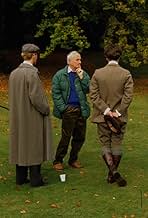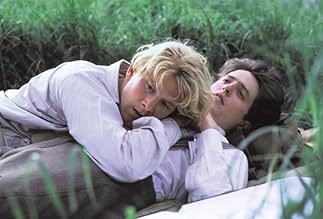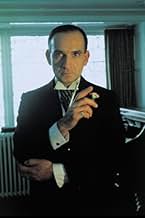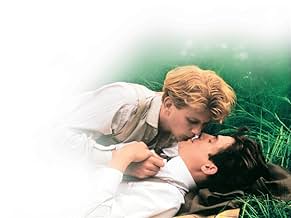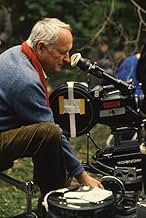IMDb-BEWERTUNG
7,6/10
26.042
IHRE BEWERTUNG
Nachdem seine Geliebte ihn zurückgewiesen hat, versucht ein junger Mann, gefangen in der Unterdrückung der edwardischen Gesellschaft, seine Sexualität zu akzeptieren und sich damit abzufinde... Alles lesenNachdem seine Geliebte ihn zurückgewiesen hat, versucht ein junger Mann, gefangen in der Unterdrückung der edwardischen Gesellschaft, seine Sexualität zu akzeptieren und sich damit abzufinden.Nachdem seine Geliebte ihn zurückgewiesen hat, versucht ein junger Mann, gefangen in der Unterdrückung der edwardischen Gesellschaft, seine Sexualität zu akzeptieren und sich damit abzufinden.
- Regie
- Drehbuch
- Hauptbesetzung
- Für 1 Oscar nominiert
- 3 Gewinne & 2 Nominierungen insgesamt
Empfohlene Bewertungen
This is the most emotional love story I have ever viewed. I first saw the film when I was about 14, and I had no problem sitting through the entire two and a half hours of rich period drama. Merchant and Ivory are two of the best filmmakers ever, and they treat this delicate subject with grace and tact. It makes being a gay teenager a little more bearable, because it is one of the few movies in which the gay lead finds love, and survives. An altogether edifying experience.
Many viewers and critics have criticised the happy ending of this film as being 'unrealistic' or even 'impossible'. After all an upper class and working class man could never live as a couple in Edwardian England? In fact E.M. Forster's inspiration for writing the book Maurice was a real gay couple, one upper class and the other working class, who lived together openly in England for about 35 years until 1928. They are buried in the same grave.
Edward Carpenter was a close friend of E.M.Forster, who named Carpenter's working class gay partner, George Merrill, as the inspiration for his novel Maurice. He had visited Carpenter and Merrill at Millthorpe in Derbyshire on several occasions: once, in 1913, Merrill "touched my backside - gently and just above the buttocks. I believe he touched most people's. The sensation was unusual and I still remember it, as I remember the position of a long vanished tooth. He made a profound impression on me and touched a creative spring" That was the origin for the writing of Maurice.
Edward Carpenter was a close friend of E.M.Forster, who named Carpenter's working class gay partner, George Merrill, as the inspiration for his novel Maurice. He had visited Carpenter and Merrill at Millthorpe in Derbyshire on several occasions: once, in 1913, Merrill "touched my backside - gently and just above the buttocks. I believe he touched most people's. The sensation was unusual and I still remember it, as I remember the position of a long vanished tooth. He made a profound impression on me and touched a creative spring" That was the origin for the writing of Maurice.
I remember I saw this movie I was about 17. I'd read the book and fell in love. It tells a love story between two men and the way they have to carry it out despite society rules (with some changes it still happens nowadays...).
The general message would be "love conquers all" but is it really so? Are Maurice and Scudder able to live happily ever after? I doubt, and on the beginning of the XXth century it would be even worse.
Despite all, it's lovely to watch the same kind of story we're used to watching in movies that portray society in different times, but now speaking about love between men! Although James Ivory's work is beyond criticism, in my point a view, there were some scenes in the book (the one when they are in London, sitting naked by the fire, for instance) that really should be in the movie.
But it's a tender and romantic approach of of book (only published after E.M. Foster's death) that surely would have pleased it's author.
The general message would be "love conquers all" but is it really so? Are Maurice and Scudder able to live happily ever after? I doubt, and on the beginning of the XXth century it would be even worse.
Despite all, it's lovely to watch the same kind of story we're used to watching in movies that portray society in different times, but now speaking about love between men! Although James Ivory's work is beyond criticism, in my point a view, there were some scenes in the book (the one when they are in London, sitting naked by the fire, for instance) that really should be in the movie.
But it's a tender and romantic approach of of book (only published after E.M. Foster's death) that surely would have pleased it's author.
A gay classic that is situated at the beginning of the twentieth century. 'Maurice' is the story of Maurice Hall, a student at the University of Cambridge, United Kingdom. There he meets Clive Durham. Both men develop a strong friendship, which to a certain level, becomes physical. Clive is gay, but Maurice doesn't want to know anything about it. Until he admits he also has feelings for persons of the same sex, even though in intellectual circles homosexuality is 'the love that dare not speak its name'.
Maurice doesn't know how to behave. Of course he wants to be himself, but society doesn't accept gay people. When he more or less decides to live as a gay man bosom friend Clive changes his mind, frightened by a lawsuit against a gay man. According to Clive the physical friendship between Maurice and Clive must end and from that moment on he wants to experience real love: the love of a woman. The relation between Maurice and Clive gets tense.
Even Maurice tries to get his sexual preference changed by visiting a hypnotist, but the treatment fails. That becomes very clear when Maurice sleeps with Scudder, Clive's under gamekeeper. A passionate love develops between Scudder and Maurice, which makes Clive realize what kind of appearance he has to keep up as a 'converted' gay man.
'Maurice' is based on the novel of the same name written by E.M. Forster. The film is beautiful and made with a feeling for historical notion. The actors playing the leading roles are straight in real life but act the gay roles in a beautiful way. Actually everything in the film is right: image, usage of language, costumes and music.
Maurice doesn't know how to behave. Of course he wants to be himself, but society doesn't accept gay people. When he more or less decides to live as a gay man bosom friend Clive changes his mind, frightened by a lawsuit against a gay man. According to Clive the physical friendship between Maurice and Clive must end and from that moment on he wants to experience real love: the love of a woman. The relation between Maurice and Clive gets tense.
Even Maurice tries to get his sexual preference changed by visiting a hypnotist, but the treatment fails. That becomes very clear when Maurice sleeps with Scudder, Clive's under gamekeeper. A passionate love develops between Scudder and Maurice, which makes Clive realize what kind of appearance he has to keep up as a 'converted' gay man.
'Maurice' is based on the novel of the same name written by E.M. Forster. The film is beautiful and made with a feeling for historical notion. The actors playing the leading roles are straight in real life but act the gay roles in a beautiful way. Actually everything in the film is right: image, usage of language, costumes and music.
Maurice' had a deep emotional impact on me when I first saw it in my early teens, more than ten years ago. I just saw it again for the first time since then and I was a bit worried that I would be disappointed, but then I was definitely not. It still had the same magic.
To me, this is the #1 Merchant-Ivory work. I find this movie astoundingly profound compared to several other of their movies. This movie is above all accomplished by the excellent acting. It tells a pure and convincing story about struggling to be true to oneself in a world of not only prejudice and firm standards but even serious legal sanctions.
I think Maurice' is far more romantic, and sexy, than most heterosexual love stories I have seen. The love and longing of these men seems so real and pure, especially by the fact that they are consistently being told that their inclination is `unspeakable', and their futures and careers are at stake.
It is great to see Hugh Grant in an early role (his first real movie role?) that is so different from the mainstream comedy entertainer he has become. The ending is stunning. I love that the movie ended exactly where it did, although it is a dread to acknowledge that the war would break out soon after. The music score is enthralling. And Alec Scudder is so beautiful that it hurts.
To me, this is the #1 Merchant-Ivory work. I find this movie astoundingly profound compared to several other of their movies. This movie is above all accomplished by the excellent acting. It tells a pure and convincing story about struggling to be true to oneself in a world of not only prejudice and firm standards but even serious legal sanctions.
I think Maurice' is far more romantic, and sexy, than most heterosexual love stories I have seen. The love and longing of these men seems so real and pure, especially by the fact that they are consistently being told that their inclination is `unspeakable', and their futures and careers are at stake.
It is great to see Hugh Grant in an early role (his first real movie role?) that is so different from the mainstream comedy entertainer he has become. The ending is stunning. I love that the movie ended exactly where it did, although it is a dread to acknowledge that the war would break out soon after. The music score is enthralling. And Alec Scudder is so beautiful that it hurts.
Wusstest du schon
- WissenswertesIn the DVD extras, Hugh Grant says that because he and James Wilby already knew each other from appearing in Privileged (1982) together, they were able to practice their scenes together at Grant's house the night before Wilby's audition. Grant says that he remembers it "being a surprise to my banker brother when he came home and found me kissing James Wilby in the front room."
- PatzerDuring one of the earlier scenes while Maurice and others are reading/translating with a professor/dean, Maurice is seen clearly wearing a wristwatch. While wristwatches did exist at the time they were rare, and were considered working class so would not have been worn by a gentleman. The wristwatch would not become common until the first world war, when they were given to soldiers to allow them to see the time while both hands were engaged.
- Zitate
Maurice Hall: I'm an unspeakable of the Oscar Wilde sort.
- Alternative VersionenSome NTSC versions are scanned at 25fps and the running time is short and seems edited but the movie is intact.
- SoundtracksMiserere Psalm 51
Written by Gregorio Allegri
Sung by The Choir of Kings College Cambridge
Courtesy of The Decca Record Company LTD.
Top-Auswahl
Melde dich zum Bewerten an und greife auf die Watchlist für personalisierte Empfehlungen zu.
- How long is Maurice?Powered by Alexa
Details
- Erscheinungsdatum
- Herkunftsländer
- Offizielle Standorte
- Sprache
- Auch bekannt als
- Moris
- Drehorte
- Produktionsfirmen
- Weitere beteiligte Unternehmen bei IMDbPro anzeigen
Box Office
- Budget
- 1.577.000 £ (geschätzt)
- Bruttoertrag in den USA und Kanada
- 2.484.230 $
- Eröffnungswochenende in den USA und in Kanada
- 49.278 $
- 20. Sept. 1987
- Weltweiter Bruttoertrag
- 2.643.324 $
- Laufzeit
- 2 Std. 20 Min.(140 min)
- Sound-Mix
- Seitenverhältnis
- 1.66 : 1
Zu dieser Seite beitragen
Bearbeitung vorschlagen oder fehlenden Inhalt hinzufügen


